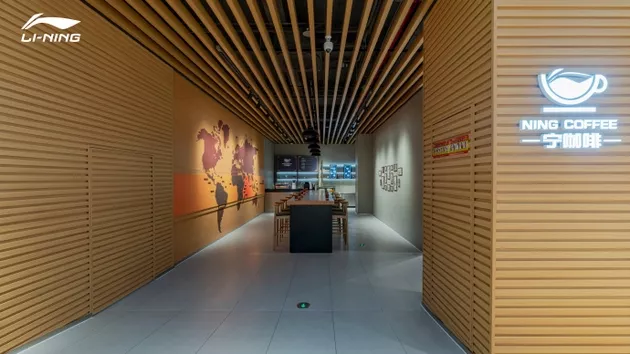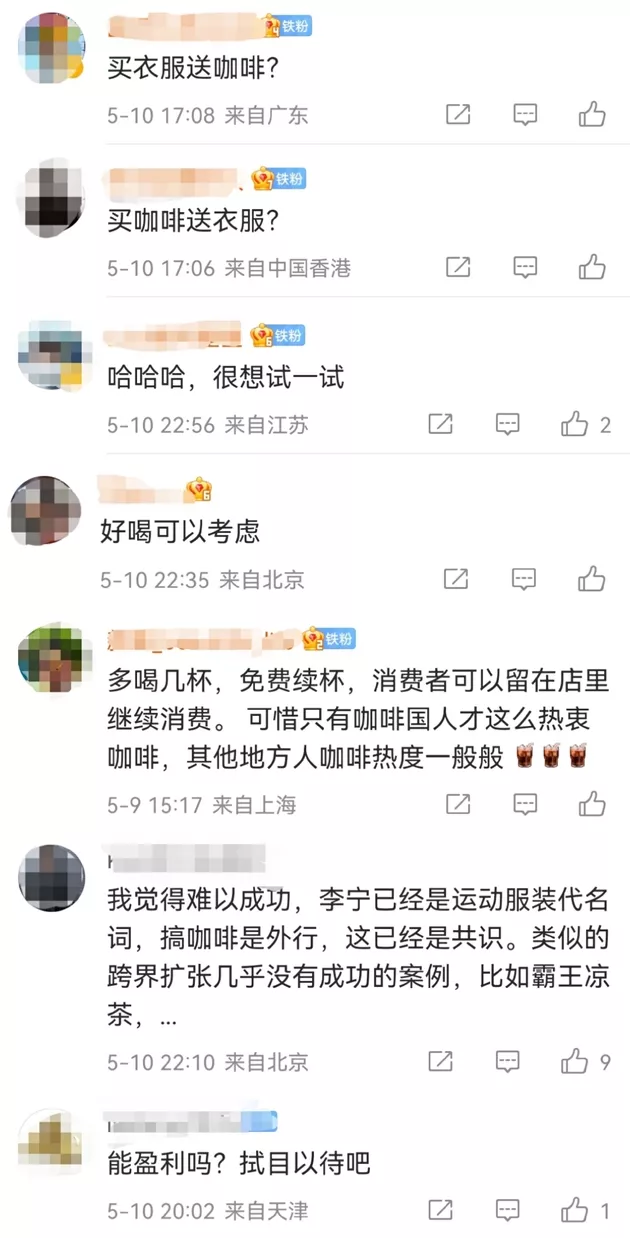When shopping for sportswear, would you like to have a cup of coffee? Recently, Li Ning's cross-border opening of "Ning coffee" aroused the curiosity of the public. Industry analysts said that coffee is only an auxiliary tool for Li Ning, and there is still a long way to compete with professional coffee brands. In addition to Li Ning, traditional industry giants such as PetroChina, Sinopec and China post are also eyeing the coffee track. Why do traditional industries want a share of coffee?
Why did Li Ning open a coffee shop without doing his job
Previously, tianyancha app showed that Li Ning Sports (Shanghai) Co., Ltd. applied to register the trademark of "Ning coffee", which is internationally classified as catering and accommodation. The cross-border selling of coffee by shoe and clothing giants has aroused the curiosity and attention of the public.
Subsequently, Li Ning responded to Zhongxin Jingwei that the company pays attention to the consumer purchase experience of retail terminals and hopes to improve the comfort and experience of customers during shopping by optimizing in store services. Providing coffee service in the store will be an innovative attempt of Li Ning for the retail terminal consumption experience.
Earlier, bloggers punched in the freshly ground coffee in Li Ning's exclusive store on social media, saying they could have a free drink after consumption. After the official announcement of "Ning coffee", when Li Ning publicized his flagship store in Xiamen on the official microblog, the figure of "Ning coffee" can be seen in the picture, and some netizens print pictures that they have drunk it.
The clerk of Li Ning Xiamen Zhonghua city flagship store told the media, "coffee drinking is not open to the public at present. Customers who come to the store can get a free drink after buying goods for 499 yuan". It is reported that the stores providing coffee business basically belong to "shopping center stores" or large flagship stores, while most smaller stores do not have this service at present.

Screenshot of Li Ning's official microblog
It can be inferred that "Ning coffee" may appear in the form of occupying part of Li Ning's offline stores in the future. According to the company's annual report, by the end of 2021, Li Ning had 5905 franchised dealers and 1232 direct retailers, a total of 7137. In other words, Li Ning may have more than 7000 offline stores, more than 5000 in Starbucks and 6000 in Ruixing.
Li Ning said in the financial report that during the year, the company continued to optimize the channel construction and layout, focus on large stores in shopping centers, continue to promote the landing of efficient large stores such as flagship stores, continue to optimize the store structure, and accelerate the processing of loss, inefficient and small area stores.
From the perspective of the main business in recent years, Li Ning can be regarded as a "layman" in the field of coffee. Li Ning's total revenue in 2021 was 22.572 billion yuan, of which clothing business contributed more than half of the revenue, followed by footwear, accounting for 42.1%, while equipment and accessories Accounting for 5.5%, there is no catering industry in the business classification.
Netizens have different opinions on the news that Li Ning opened a coffee shop. Some people expressed support for Li Ning's crossover. If the coffee is good, you can try it; There are also views that this cross-border model is difficult to make profits.

Zhu danpeng, a food industry analyst, told Zhongxin Jingwei that coffee is only an auxiliary tool for Li Ning to increase viscosity. It is a measure to meet and close to the needs of the new generation of consumers. Coffee is not Li Ning's main business and has little impact on its main business. From the perspective of the industry, at present, the coffee track belongs to the node of high-speed growth and capacity expansion. It is in the dividend period. In the future, there will be more brands and more differentiated products.
Lin Yue, chief analyst of Lingyan consulting management, said that most of Li Ning's stores are just a foundation. The business formats of coffee and shoes and clothing are different. Consumers who want to buy clothes, shoes and hats usually don't think of enjoying a cup of coffee in the store, and coffee will occupy the experience space of the store.
Chain giants are eyeing the coffee market
Li Ning is not the first company to sell coffee across borders. In fact, the track of cross-border coffee is very lively.
According to media reports, in February, China Post's first post office coffee landed in Xiamen international trade building. The cheapest cup of coffee was 22 yuan. In addition, the coffee shop also sells tea, dessert and around the post office. It is understood that China Post had previously sold milk tea.
In February 2021, Tongrentang opened a coffee shop, and the concept of "Zhima health" and "health coffee" attracted a large number of young people for a time. According to media reports in 2021, from the perspective of store benefits, coffee drinks with the highest sales volume did not bring large profits, but as a drainage means, health products and sub-health diagnosis and treatment really brought profits. Compared with Starbucks and tims coffee in the same area, there is still a large gap in the sales of Tongrentang coffee.
"Two barrels of oil" PetroChina and Sinopec have also set foot in the field of coffee. In 2018, PetroChina began to set up freshly ground coffee in its Kunlun hospitality convenience store. It is reported that at present, PetroChina has more than 120 Kunlun hospitality coffee stores.
In February 2021, the joint venture established by Sinopec and Lian coffee launched its own brand "Yijie coffee", which mainly sells coffee drinks and light foods, and consumers can also choose the service of "delivery to the car". According to the official official account of easyJet coffee, as of November 2021, the brand has 54 stores in Beijing, Suzhou and other places, mainly located in Sinopec gas stations. However, this figure is still far from its plan of "opening 3000 stores in three years".
Why do traditional giants prefer coffee? In this regard, Zhao chilei, director of Qingtong capital investment, told the media that one of the reasons why traditional brands are moving towards fast consumption is to find the second growth curve. Traditional brands also face some problems, such as fierce competition, incremental to the ceiling, compressed profit space, etc., so they need to expand their own channels. In addition, it is the spillover of the brand's own ability, such as supply chain channels, points or brand recognition. We will also pay for the expansion of new categories.
According to AI media consulting, China's coffee market has entered a stage of rapid development. The scale of China's coffee market will be about 381.7 billion yuan in 2021. It is expected that the industry will maintain a growth rate of 27.2%, and the scale of China's coffee market will reach 100 billion yuan in 2025.
As non professional players, will the entry of traditional giants squeeze the living space of astrological buck and Ruixing? In this regard, Zhu danpeng analyzed that on the whole, there are still opportunities to sell coffee across borders, but compared with professional coffee brands, the opportunities are not large.
"From the cross-border of giants such as Li Ning, China Post and China Petroleum, we can see that their brand positioning is different from that of professional coffee makers. They have the advantages of network channel resources, store cost and traffic. However, we need to worry about whether they can really polish their products without innate coffee genes. For example, in terms of scene and brand tone, they may become the relative disadvantage of traditional brands in the competition."